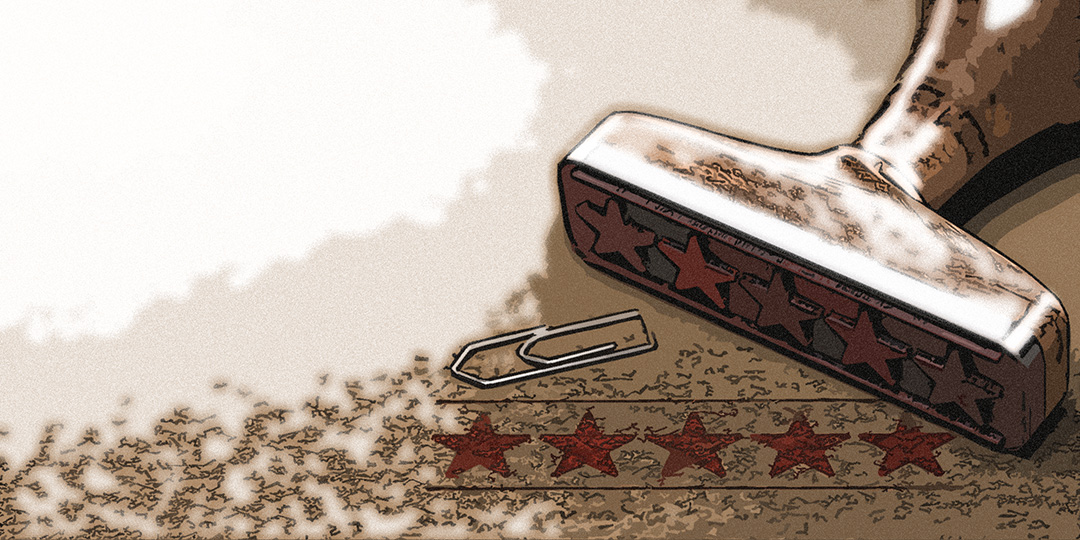The online review fallacy
With everybody buying online at the moment, due to… issues, I figured I'd write a little about something that has bugged me for a while now: Online Reviews.
Specifically, the irksome trend that they might as well be a randomly generated 5-star rating.
There seems to be a large number of people that do not understand how a score-based system works and how to accurately use them to portray your feelings towards a particular product or experience to other internet users.
The first problem with the sliding scale approach, impacts more than one might think.
Consider your own rating "strategy", are you one to never give a 5-star for some foolish notion that it would dilute or sully the concept of your "superior" ratings in the eyes of the public? I'll dispel that myth quickly now, unless you're an extremely trusted influencer *cough* reviewer on a dedicated platform, no one knows who you are on Amazon, nor do they care. They are not looking for you specifically, nor are they interested in your intellect in any way. People reading your review about a product are interested in finding out more about the product, you will not gain their friendship, and you will not be remembered review-to-review. As an aside to this, apparently my own mother (somehow) has a fairly strong following as a local food critic on one of them-thar foodie websites and has influence on where people eat – this is obviously the exception to the rule, and requires the wider trust of the quality of your honest, well-thought-out reviews.
Unless you are in this boat, you are probably doing more damage than good.
How?
Let us start with the almighty, all-consuming behemoth that is "the algorithm".
All major shopping platforms will implement an algorithm internally (although more likely, externally, so you buy more). It can be as simple as tracking what products sell well, are likely to sell well in the future, all the way through to recommending you every single piece of Harry Potter memorabilia under the sun, because your wife is a fan and you got her something nice for her birthday.
Metadata based on product reviews are factored into the algorithm to determine it's weighting to display in the marketplace – a product with good reviews can rank higher in the store listings, even if it is up against a product that has sold more, but has a weaker review score.
Now, dear reader, you might be thinking – so? I read the content of the review to determine whether a product is a good fit for my purposes. Great! That is what you should be doing when researching options. But not everything is about you now is it?
The very livelihoods of hardworking people are inextricably linked to your (or someone else's) decision to hit 4 stars instead of 5. Consider this scenario: you've just purchased a locally made jam from a major shopping platform. Having done your civic duty by paying a bit more for the one made by a family company, you try it and think it is sublime and you remember this fact when it comes time to fill out the review form when the reminder email shows up.
You think to yourself, it was excellent and click 4-stars, because you only save the full 5-stars for things you simply cannot live without (or worse, things that you blindly love despite it's flaws, but brand loyalty has made you it's slave).
If you haven't been objective in your reasoning and the jar of jam is undoubtedly a magnificent product, you might have robbed that small family business of work. The damage is more apparent if the next product in queue to take top spot in the algorithm is made by a huge multi-national corporation that can probably afford to skip a few sales when it comes to competing with a local family businesses (yes, the people working for the large factory still have jobs that can be lost based on changes in the marketplace, but they're less likely to be worried about a handful of sales, whereas the local family business might only expect to sell 25 jars a fortnight).
When it comes to the algorithm, someone else might have really enjoyed their corporation jam and decided it was really worth their 5-stars. The corporation takes the top spot, and the 25 jars the family company was expecting to sell dwindles – within a week the business starts suffering, because they've dropped further down the list, into the wastelands of "below the fold" (a lawless place where one must fight off others for scraps thrown to them by the worthy traveller that can be bothered scrolling down the page slightly). A month after your 4-star review, they've sold all their organs to make ends meet and are considering eating the children. You monster. Just look at what you've done.
Now – of course if there was a justifiable reason to mark them down that extra star, then fine, we wouldn't want to reverse the problem and over inflate an unworthy product. No, you've submitted an honest review and made it clear why you felt why the jam wasn't quite a 5-star experience when you smeared it on your morning toast. Right?
That brings me to my next point: Ratings without reviews. Where a review feels that a product is wonderful (or absolutely abysmal) and have gone through the effort of tapping the array of stars, but call it a day when it comes to the extra few seconds it takes to type out a few words to explain this conclusion.
Take this example:

This is a review chain for a tourist attraction, somewhere in the world (an island with a lighthouse that you can visit).
There is a total of 6 reviews, and all seem to have a general consensus of being generally excellent (5-stars).
Then there is this muppet at the bottom here, who felt the need to say that this particular island is the worst island he's ever been on – but not say a single word about why.
Was he expecting a desert, but ended up on this lush grassy island instead? Did he not like the tour guide? (in which-case why did he feel the island needed to take the brunt of it?), Did the island somehow injure him? (was it really the island though? or rather an involuntary act of self-harm cause by the sudden onset of stupidity?).
The mystery may never be answered, and some random dullard has now caused the island to receive an average of 4.3 stars. You know what beats an island with 4.3 stars? The one with a 4.4 star rating, which might be the reverse problem – an island that only deserves 4 stars, but has a few 5 star reviews thrown in for good measure.
Coming back to reviewing products, a one-star with a single word is much more valuable than a random one star that lacks the motivation behind it. Simply saying 'D.O.A.' (dead on arrival) gives a better idea of why you marked the product so low. Now in this specific case, labelling something as dead on arrival invites failures from other quarters (such as a shipping issue), rather than the product itself, but at least someone reading through the list of reviews would be able to consider (or discount) those three letters and factor it into their own decision making process.
It's not particularly helpful to someone reading about a product, but if there is a high number of faulty units that are shipped, then a buyer might reasonably assume that there is a defect in the product itself, or the way the product is packaged. Yes, again, this might be more a problem of the seller, and might unfairly tarnish the review scoring of the product, but at least there is an extra piece of information that the buyer can assess (that would otherwise be lost).
Finally, I'd like to cover junk reviews. I'm counting fake reviews as junk, because they serve no purpose other than to manipulate the algorithm, either in favour of a company, or against the competition.
Junk reviews themselves don't necessarily have the stated goal of algorithm manipulation, but may do so anyway out of a shear act of weapons grade lunacy. These are the 1-star ratings alongside "great product", the reviews clearly destined for other products, or the reviews that fall into the fanboy category (1-star because "lol, it doesn't run Android, wAy To PrOmOtE VeNdOr LoCk-In Micro$haft!!!!!").
I have genuinely seen a review for a client's business that read something along the lines of "excellent service, would give them 5-stars any day" followed by a 3-stars. This forced the customer down so far that their Google Maps placement was outshined by the previous lease holder who was marked as "permanently closed". It mirrors other such reviews that I have come to automatically flag as junk in my mind when reading through things (like 4-star with 'Excellent!' as the review – what constitutes 5-star? Does it need to be hand delivered by the messiah himself?)
So, how do we combat this algorithm manipulation, misinformation spreading, inaccurate madness?
Around a year ago, I launched an experimental website, aimed at giving a precise barometer of the watchability of a movie or TV show. OctetReviews, introduces the concept of the "Octet" a super-short review that contains no more than 8 words and a "good" or "bad" rating.
After using it for the past year (and revamping the core code around 4 months ago), I've found that this way of reviewing a product has made me be a bit more honest about my feelings towards a movie – even though there's been a few cases where I've been undecisive about middle of the road movies. Forcing a positive or negative means I need to think about my own personal enjoyment of the film. Robocop for example, terrible cheesy 80's action movie subjectively, but because it's a terrible cheesy 80's action movie, I enjoyed watching it again on TV recently (more than I disliked watching it, so overall it garnered a positive review).
Each positive or negative is aggregated, so a movie only gains traction if it's overwhelmingly voted up. My 'nostalgia' goggles won't count for much if I'm the only plus in a sea of minuses.
Does this solve every issue? No, there will still be people that fail to understand the concept (as easy to use as I have tried to make it, the tried and true method of 5-stars is lost on some, so introducing a new mind-set might not go down too well).
Go forth and review (responsibly!)




